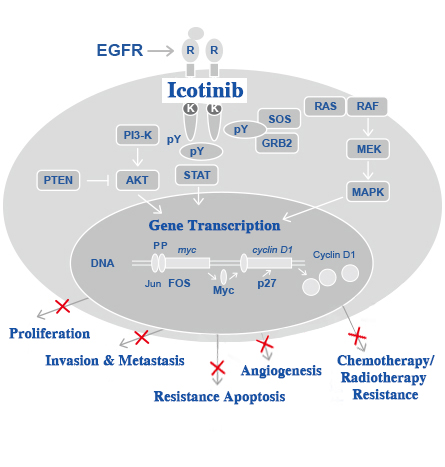Epidermal growth factor receptor (EGFR) is highly expressed in many types of tumor cells. Upon binding to its ligand epidermal growth factor (EGF), EGFR activates the kinase activity of the EGFR cytoplasmic region, regulates the transcription of multiple genes through various signaling pathways, which affects cell proliferation, differentiation, apoptosis, etc. Epidermal growth factor receptor-tyrosine kinase inhibitor (EGFR-TKI) can specifically and competitively bind to the ATP-binding site of the EGFR kinase domain, inhibiting its kinase activity as well as blocking the transmission of related signals such as cancer cell proliferation and metastasis. Due to the selectivity of EGFR-TKI on tumor cells, there is no significant side effect caused by common chemotherapeutic drugs such as myelosuppression, hair loss, and renal dysfunction.
Icotinib hydrochloride is a small molecule compound that can enter cells. For the first time, using a combination of structure-activity relationship analysis and computer simulations, a crown ether ring was incorporated into the drug design to develop a new chemical entity. Through a series of innovative studies, highly potent and specific small-molecule EGFR kinase inhibitors were screened and the salt form as well as the crystal form with high bioavailability and stability were determined.
As a novel targeted therapy, the mechanism of icotinib hydrochloride is different from that of cytotoxic drugs. It competes with adenosine triphosphate on the ATP binding site of EGFR, blocking the EGFR signaling pathway and tumor cell growth and progress by preventing the tyrosine kinase to be activated. In vitro studies have shown that icotinib hydrochloride can suppress the proliferation, infiltration and metastasis of tumor cells, promote cell apoptosis, and prevent tumor angiogenesis. The phase III study of icotinib hydrochloride used an imported drug as the positive control for a randomized, double-blind study, and the results revealed the good anti-tumor effects of icotinib hydrochloride on locally advanced or metastatic NSCLC patients after previously failed chemotherapy. The head-to-head study of icotinib hydrochloride with the imported drug showed comparable efficacy with a lower adverse event rate, indicating a better safety profile of icotinib hydrochloride. |  |

